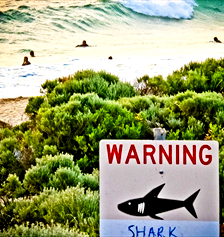Legal tweak for shark cull upheld
 Courts have ruled that the Western Australian Government's shark cull is legal, after a challenge by environmental group Sea Shepherd.
Courts have ruled that the Western Australian Government's shark cull is legal, after a challenge by environmental group Sea Shepherd.
Sea Shepherd launched action in the Supreme Court against the WA Government, saying the shark-killing policy was enacted without proper authorisation.
The court has found that exemptions made to the state’s Fish Resources Management Act to enable the cull were valid.
The policy has seen baited lines suspended in water near popular beaches, leading to the deaths of dozens of sharks in just a few weeks.
Premier Colin Barnett said in a statement about the ruling that it showed the Government followed a rigorous and legitimate process to define the scope of the marine destruction.
He said Sea Shepherd’s case rested on disputes over technical wording, rather than legitimate opposition.
Sea Shepherd says the legitimacy of the case came from its efforts to protect other species, which could be placed in the cross-hairs with a similar legal amendment.
“Whether it's whales or dolphins, can they simply have exemptions to kill these animals as well?” Sea Shepherd's managing director Jeff Hansen asked.
“What next can be targeted?”
“These are protected animals off our coast that play a vital role in the health of our oceans.
“We had an obligation to many people, many conservation groups and to public safety to have a crack at this case.
“From a point of view of ecology of our oceans, from a point of view of health of our oceans, the legal advice was strong. We believed we were in with a good chance but we respect the judge's call on this.”
Other state governments have employed the same techniques for a number of years.
Queensland and New South Wales both maintain a series of shark nets in waters off their coasts under the pretence of assisting public safety.
However, there has been little evidence that the nets effectively reduce shark attacks. They are often criticised as a pointless and destructive effort as they catch more non-shark animals than sharks, and do not extend the full length or depth of the areas they cover.








 Print
Print